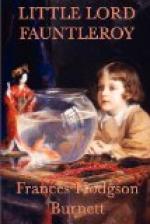“Just like the Fourth of July!” said Lord Fauntleroy. “It seems a pity my birthday wasn’t on the Fourth, doesn’t it? For then we could keep them both together.”
It must be confessed that at first the Earl and Mr. Hobbs were not as intimate as it might have been hoped they would become, in the interests of the British aristocracy. The fact was that the Earl had known very few grocery-men, and Mr. Hobbs had not had many very close acquaintances who were earls; and so in their rare interviews conversation did not flourish. It must also be owned that Mr. Hobbs had been rather overwhelmed by the splendors Fauntleroy felt it his duty to show him.
The entrance gate and the stone lions and the avenue impressed Mr. Hobbs somewhat at the beginning, and when he saw the Castle, and the flower-gardens, and the hot-houses, and the terraces, and the peacocks, and the dungeon, and the armor, and the great staircase, and the stables, and the liveried servants, he really was quite bewildered. But it was the picture gallery which seemed to be the finishing stroke.
“Somethin’ in the manner of a museum?” he said to Fauntleroy, when he was led into the great, beautiful room.
“N—no—!” said Fauntleroy, rather doubtfully. “I don’t think it’s a museum. My grandfather says these are my ancestors.”
“Your aunt’s sisters!” ejaculated Mr. Hobbs. “All of ’em? Your great-uncle, he must have had a family! Did he raise ’em all?”
And he sank into a seat and looked around him with quite an agitated countenance, until with the greatest difficulty Lord Fauntleroy managed to explain that the walls were not lined entirely with the portraits of the progeny of his great-uncle.
He found it necessary, in fact, to call in the assistance of Mrs. Mellon, who knew all about the pictures, and could tell who painted them and when, and who added romantic stories of the lords and ladies who were the originals. When Mr. Hobbs once understood, and had heard some of these stories, he was very much fascinated and liked the picture gallery almost better than anything else; and he would often walk over from the village, where he staid at the Dorincourt Arms, and would spend half an hour or so wandering about the gallery, staring at the painted ladies and gentlemen, who also stared at him, and shaking his head nearly all the time.
“And they was all earls!” he would say, “er pretty nigh it! An’ he’s goin’ to be one of ’em, an’ own it all!”
Privately he was not nearly so much disgusted with earls and their mode of life as he had expected to be, and it is to be doubted whether his strictly republican principles were not shaken a little by a closer acquaintance with castles and ancestors and all the rest of it. At any rate, one day he uttered a very remarkable and unexpected sentiment:
“I wouldn’t have minded bein’ one of ’em myself!” he said—which was really a great concession.




